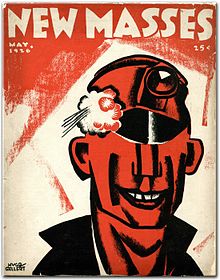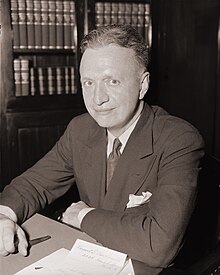Sidney Finkelstein
Sidney Finkelstein (1909–1974) was an American cultural critic with wide-ranging interests in literature, music and fine arts, which he analyzed from a Marxist perspective.
[5] In a retrospective about him, Finkelstein was described as "a former newspaper writer turned Marxist arts critic",[2] which succinctly captures the arc of his career.
[8] Because his books started to appear just as the Second Red Scare intensified, Michael Denning has suggested that Finkelstein's works "received—and continue to receive—far less attention than the Marxist works of the 1930s, despite the fact that Finkelstein is a far more interesting Marxist critic than [Mike] Gold, [Joseph] Freeman, [Granville] Hicks, or [V.F.]
"[11] The committee questioned the school's director, Lilly Popper, and several board members who all invoked the Fifth Amendment when asked about their Communist Party affiliation, which was banned at the time under the Smith Act.
[13] The committee identified him as "cultural spokesman for the Communist Party" and a member of the Metropolitan Music School's board of directors.
My second reason is the fact that I think that this committee's operations are an invasion of the right of free speech guaranteed by the first amendment of the Constitution, where Congress is prohibited to legislate.
[7]At one point in his testimony, Congressman Clyde Doyle quoted the following passage from Finkelstein's writings: "The FBI has its paid informers everywhere, and almost any lodge, church, political meeting, or labor organization may be victimized by these peeping toms."
Rep. Doyle then asked, "Where in God's name would our Nation be if the FBI wasn't able to get patriotic American citizens to go into these organizations in which Commies, crooks, cheats, and traitors infiltrate?
In a tribute piece written decades later, Rosenberg noted that Finkelstein's house in Brooklyn had floor-to-ceiling books, along with thousands of 78s and LPs.
They listened together to Lester Young, Charlie Parker and other favorite jazz artists, and Finkelstein lent Rosenberg several records.
[34] In 2015, The New York Times cited Finkelstein in an article on the 1942 jazz-themed film Syncopation directed by William Dieterle.
[36] The University of Massachusetts Amherst houses Finkelstein's papers, which include correspondence with publisher Angus Cameron, artist Rockwell Kent, playwright and screenwriter John Howard Lawson, educator Howard Selsam, and music composer Virgil Thomson.


